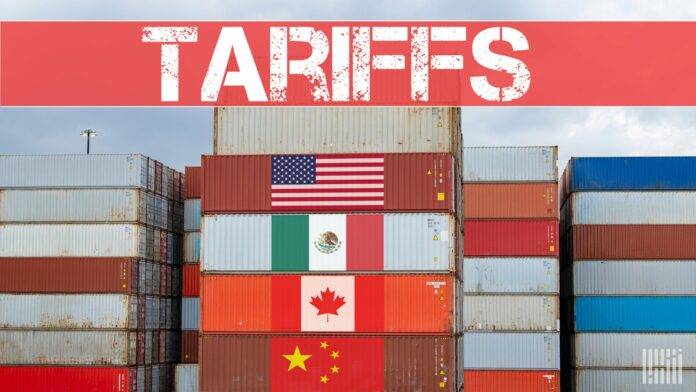Borderlands is a weekly overview of significant developments in the realm of cross-border trucking and trade between the United States and Mexico. This week’s highlights include insights from experts on mitigating the impact of potential tariffs, the opening of a new railway bridge by CPKC in Texas, expansion plans from a Canada-based components manufacturer in Mexico, and Mexico’s recent repeal of its ban on genetically modified corn imports.
Mitigating Tariff Impacts Through Supply Chain Diversification
As the prospect of tariffs on imports from Canada and Mexico looms closer, supply chain operators are urged to devise strategies that minimize the potential repercussions of increased duties. Vinny Licata, head of logistics at Fictiv, emphasizes that diversifying supply chains—ranging from relocating manufacturing operations to adopting multicountry assembly strategies—can significantly mitigate the effects of tariffs and other disruptions.
Licata noted, “The past five years have presented numerous challenges including the pandemic, geopolitical tensions, and extreme weather events that have disrupted global supply chains.” He advocates for proactive diversification, whether on a global scale or within domestic operations, to ensure supply chain resilience.
In early February, President Donald Trump signed an executive order imposing 25% tariffs on imports from Canada and Mexico, alongside a 10% tax on goods from China. Although these tariffs would affect nearly all imports from the two North American countries—excluding Canadian energy imports, which would incur a 10% levy—the Trump administration has since paused the tariffs against Mexico and Canada for at least a month to facilitate negotiations.
Licata argues that a diversified supply chain empowers companies to pivot to lower-tariff regions, whether domestically or internationally, thereby meeting their logistical and cost requirements more effectively. “Strategic planning across the entire supply chain is essential,” he states.
He also highlighted actionable strategies supply chain managers can implement to navigate the proposed tariffs, such as applying for tariff exclusions, optimizing product classifications, utilizing duty drawbacks, and diversifying suppliers. Furthermore, Licata suggests leveraging the first sale rule to reduce the duty impact by paying the initial sale price rather than the transfer price, provided regulations are met.
Moreover, multicountry assembly operations are essential for companies to swiftly adapt to geopolitical challenges and tariff issues. “The ability to adjust production lines quickly, such as shifting from manufacturing alcohol to hand sanitizer, is a critical competitive edge,” Licata notes.
A network of manufacturers across various continents offers significant advantages in addressing tariff-related challenges. Licata adds, “Focusing on multiple manufacturing options—like China, India, or Mexico—will provide companies with greater flexibility and resilience. A strong presence in the U.S. is also vital for demonstrating commitment to local investment and market participation in the future.”
CPKC Launches New Texas Cross-Border Railway Bridge
Canadian Pacific Kansas City (CPKC) has inaugurated the Patrick J. Ottensmeyer International Railway Bridge, a $100 million project that connects Laredo, Texas, with Nuevo Laredo, Mexico. This new freight rail bridge is expected to double the volume of goods transported by rail between the U.S., Mexico, and Canada.
The bridge enables simultaneous two-way train operations and accommodates up to 3,500 loaded cars daily. In 2024, the Laredo Customs District processed over 300,000 railcar shipments, with rail freight between the U.S. and Mexico exceeding $95 billion in 2023, according to the Census Bureau.
Mexican President Claudia Sheinbaum remarked, “This railway bridge symbolizes the trade agreement between our three countries, facilitating the movement of goods from central Mexico to Canada.”
Expansion of Canada-Based Components Maker in Mexico
Exo-s, a Montreal-based supplier of automotive and specialty products, has announced plans to invest $14.6 million to expand its manufacturing facility in San Juan del Río, Mexico. This expansion aims to bolster production capacity to meet the rising demand in the automotive sector and will create 100 new jobs.
Currently, Exo-s exports 30% of its production to the United States and seeks to enhance its market presence in Mexico through this strategic investment.
Mexico Repeals Ban on Imports of Genetically Modified Corn
In a significant policy shift, Mexican authorities have suspended restrictions on importing genetically modified corn into the country. This decision follows a December ruling from a dispute panel under the United States-Mexico-Canada Agreement (USMCA), which overturned a decree from former President Andrés Manuel López Obrador aimed at protecting native white corn species.
The resolution to rescind the ban was published in Mexico’s Federal Official Gazette, signed by Minister of Economy Marcelo Ebrard, in adherence to the panel’s findings. The USMCA dispute originated from a formal complaint filed by the U.S. in February 2023.
As the largest importer of U.S. corn, Mexico imported $5.3 billion worth of corn in 2023, encompassing both yellow and white varieties. The repeal of the ban marks a pivotal moment in trade relations and agricultural policy between the U.S. and Mexico, potentially impacting future agricultural practices and trade dynamics in the region.
In summary, recent developments in the U.S.-Mexico trade relationship underscore the need for strategic adaptability within supply chains and highlight the ongoing evolution of cross-border trade infrastructure and policies.




